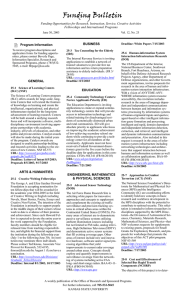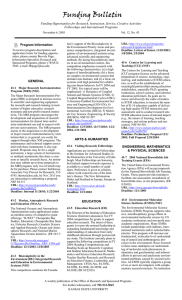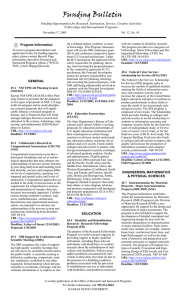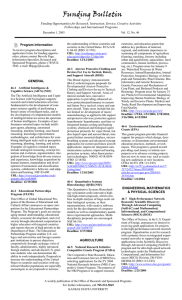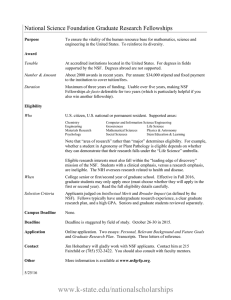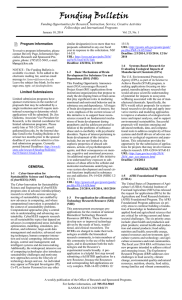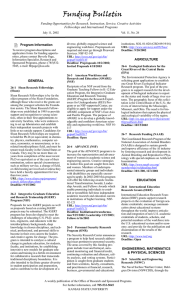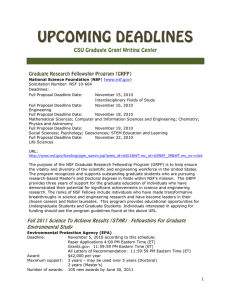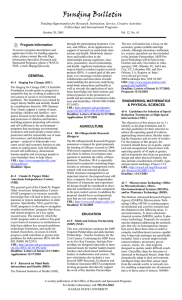Funding Opportunities for Research, Instruction, Service, Creative Activities
advertisement
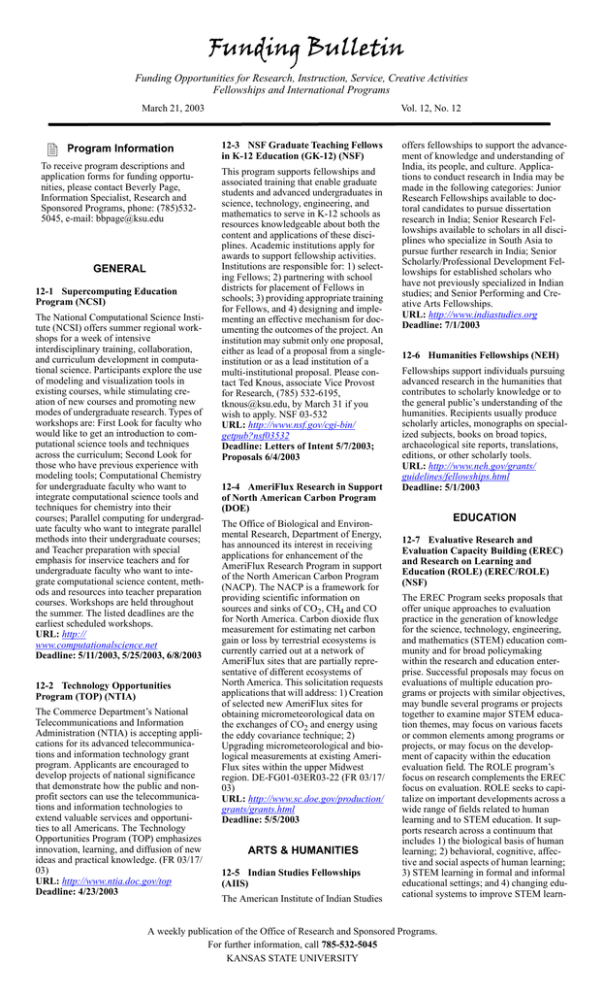
Funding Bulletin Funding Opportunities for Research, Instruction, Service, Creative Activities Fellowships and International Programs March 21, 2003 Program Information To receive program descriptions and application forms for funding opportunities, please contact Beverly Page, Information Specialist, Research and Sponsored Programs, phone: (785)5325045, e-mail: bbpage@ksu.edu GENERAL 12-1 Supercomputing Education Program (NCSI) The National Computational Science Institute (NCSI) offers summer regional workshops for a week of intensive interdisciplinary training, collaboration, and curriculum development in computational science. Participants explore the use of modeling and visualization tools in existing courses, while stimulating creation of new courses and promoting new modes of undergraduate research. Types of workshops are: First Look for faculty who would like to get an introduction to computational science tools and techniques across the curriculum; Second Look for those who have previous experience with modeling tools; Computational Chemistry for undergraduate faculty who want to integrate computational science tools and techniques for chemistry into their courses; Parallel computing for undergraduate faculty who want to integrate parallel methods into their undergraduate courses; and Teacher preparation with special emphasis for inservice teachers and for undergraduate faculty who want to integrate computational science content, methods and resources into teacher preparation courses. Workshops are held throughout the summer. The listed deadlines are the earliest scheduled workshops. URL: http:// www.computationalscience.net Deadline: 5/11/2003, 5/25/2003, 6/8/2003 12-2 Technology Opportunities Program (TOP) (NTIA) The Commerce Department’s National Telecommunications and Information Administration (NTIA) is accepting applications for its advanced telecommunications and information technology grant program. Applicants are encouraged to develop projects of national significance that demonstrate how the public and nonprofit sectors can use the telecommunications and information technologies to extend valuable services and opportunities to all Americans. The Technology Opportunities Program (TOP) emphasizes innovation, learning, and diffusion of new ideas and practical knowledge. (FR 03/17/ 03) URL: http://www.ntia.doc.gov/top Deadline: 4/23/2003 Vol. 12, No. 12 12-3 NSF Graduate Teaching Fellows in K-12 Education (GK-12) (NSF) This program supports fellowships and associated training that enable graduate students and advanced undergraduates in science, technology, engineering, and mathematics to serve in K-12 schools as resources knowledgeable about both the content and applications of these disciplines. Academic institutions apply for awards to support fellowship activities. Institutions are responsible for: 1) selecting Fellows; 2) partnering with school districts for placement of Fellows in schools; 3) providing appropriate training for Fellows, and 4) designing and implementing an effective mechanism for documenting the outcomes of the project. An institution may submit only one proposal, either as lead of a proposal from a singleinstitution or as a lead institution of a multi-institutional proposal. Please contact Ted Knous, associate Vice Provost for Research, (785) 532-6195, tknous@ksu.edu, by March 31 if you wish to apply. NSF 03-532 URL: http://www.nsf.gov/cgi-bin/ getpub?nsf03532 Deadline: Letters of Intent 5/7/2003; Proposals 6/4/2003 12-4 AmeriFlux Research in Support of North American Carbon Program (DOE) The Office of Biological and Environmental Research, Department of Energy, has announced its interest in receiving applications for enhancement of the AmeriFlux Research Program in support of the North American Carbon Program (NACP). The NACP is a framework for providing scientific information on sources and sinks of CO2, CH4 and CO for North America. Carbon dioxide flux measurement for estimating net carbon gain or loss by terrestrial ecosystems is currently carried out at a network of AmeriFlux sites that are partially representative of different ecosystems of North America. This solicitation requests applications that will address: 1) Creation of selected new AmeriFlux sites for obtaining micrometeorological data on the exchanges of CO2 and energy using the eddy covariance technique; 2) Upgrading micrometeorological and biological measurements at existing AmeriFlux sites within the upper Midwest region. DE-FG01-03ER03-22 (FR 03/17/ 03) URL: http://www.sc.doe.gov/production/ grants/grants.html Deadline: 5/5/2003 ARTS & HUMANITIES 12-5 Indian Studies Fellowships (AIIS) The American Institute of Indian Studies offers fellowships to support the advancement of knowledge and understanding of India, its people, and culture. Applications to conduct research in India may be made in the following categories: Junior Research Fellowships available to doctoral candidates to pursue dissertation research in India; Senior Research Fellowships available to scholars in all disciplines who specialize in South Asia to pursue further research in India; Senior Scholarly/Professional Development Fellowships for established scholars who have not previously specialized in Indian studies; and Senior Performing and Creative Arts Fellowships. URL: http://www.indiastudies.org Deadline: 7/1/2003 12-6 Humanities Fellowships (NEH) Fellowships support individuals pursuing advanced research in the humanities that contributes to scholarly knowledge or to the general public’s understanding of the humanities. Recipients usually produce scholarly articles, monographs on specialized subjects, books on broad topics, archaeological site reports, translations, editions, or other scholarly tools. URL: http://www.neh.gov/grants/ guidelines/fellowships.html Deadline: 5/1/2003 EDUCATION 12-7 Evaluative Research and Evaluation Capacity Building (EREC) and Research on Learning and Education (ROLE) (EREC/ROLE) (NSF) The EREC Program seeks proposals that offer unique approaches to evaluation practice in the generation of knowledge for the science, technology, engineering, and mathematics (STEM) education community and for broad policymaking within the research and education enterprise. Successful proposals may focus on evaluations of multiple education programs or projects with similar objectives, may bundle several programs or projects together to examine major STEM education themes, may focus on various facets or common elements among programs or projects, or may focus on the development of capacity within the education evaluation field. The ROLE program’s focus on research complements the EREC focus on evaluation. ROLE seeks to capitalize on important developments across a wide range of fields related to human learning and to STEM education. It supports research across a continuum that includes 1) the biological basis of human learning; 2) behavioral, cognitive, affective and social aspects of human learning; 3) STEM learning in formal and informal educational settings; and 4) changing educational systems to improve STEM learn- A weekly publication of the Office of Research and Sponsored Programs. For further information, call 785-532-5045 KANSAS STATE UNIVERSITY ing. NSF 03-542 URL: http://www.nsf.gov/cgi-bin/ getpub?nsf03542 Deadline: EREC 5/15/2003; ROLE 6/1/ 2003; ROLE 12/10/2003 cols, performance, latency, and guaranteed levels of service. NSF 03-539 URL: http://www.nsf.gov/cgi-bin/ getpub?nsf03539 Deadline: 5/8/2003 ENGINEERING, MATHEMATICS & PHYSICAL SCIENCES 12-11 Networking Research Testbeds (NRT) Program (NSF) 12-8 Special Projects Office (SPO) Office-wide BAA (DARPA) (DOD) The Defense Advanced Research Projects Agency/Special Projects Office (DARPA/ SPO) researches, develops, demonstrates and transitions technologies focused on addressing present and emerging national challenges. SPO is developing technologies to counter the emerging threat of underground facilities, used for purposes ranging from command-and-control, to weapons storage and staging, to the manufacture of weapons of mass destruction. SPO is also developing significantly more cost-effective ways to counter proliferated, inexpensive cruise missiles, UAV’s and other platforms used for weapon delivery, jamming, and surveillance. SPO is investing in novel space sensing approaches and extremely large space structures to enable tactical sensing from space. Finally, investments are being made in technologies to provide full-scale comprehensive collective protection systems against the threat of chemical and biological attack. BAA02-10 URL: http://www.darpa.mil Deadline: 4/15/2003 12-9 National Spatial Data Infrastructure (DOI) The purpose of the National Spatial Data Infrastructure (NDSI) Cooperative Agreements Program is to facilitate and foster partnerships, alliances, and technology within the various public and private entities to assist in building the NSDI. The FY 2003 NSDI program will fund projects in five categories of activities: 1) metadata implementation assistance; 2) metadata trainer assistance; 3) metadata outreach; 4) clearinghouse integration with OpenGIS services; and 5) U.S. and Canadian Spatial Data Infrastructure development. Program Announcement #03HQPA0006 (FR 03/07/03) URL: http://www.usgs.gov/contracts/ index.html Deadline: 5/2/2003 12-10 Experimental Infrastructure Network (EIN) (NSF) The purpose of the NSF Experimental Infrastructure Networks (EIN) is to establish, address, explore, and experiment with next generation network infrastructure technologies to meet the rapidly emerging requirements of e-Science and other advanced applications which are not being addressed by today’s research networks (e.g., Abilene or vBNS) or the Internet. The EIN will be driven by applications which push the leading edges of network technologies and capabilities, such as higher bandwidth, alternate proto- The Networking Research Testbeds (NRT) program will create a new generation of networking technologies through the process of ideation, realization and experimentation carried out on a diverse set of research testbeds. Through this program, researchers will be able to test and refine new concepts and architectures on a number of independent testbeds that have been designed and built by networking researchers themselves. NRT’s can range in size from small campus-size testbeds to larger regional or national-scale testbeds, depending on the level of collaboration, partnership and the project mission. NSF 03-538 URL: http://www.nsf.gov/cgi-bin/ getpub?nsf03538 Deadline: 5/8/2003 12-12 Research Opportunity Awards (RESCORP) Research Opportunity Awards are for scientists of demonstrated productivity and creativity seeking to explore new areas of experimental research. The chair of each Ph.D.-granting astronomy, chemistry, or physics department in the United States and Canada may nominate up to two tenured faculty members annually who are without major research funding (less than $30,000 per year). Following internal review, proposals will be invited from selected nominees. URL: http://www.rescorp.org/roa.htm Deadline: 5/1/2003, 10/1/2003 make publicly available the tools and information developed. RFA GM-03-008 (NIGH 03/14/03) URL: http://grants.nih.gov/grants/guide/ rfa-files/RFA-GM-03-008.html Deadline: Letters of Intent 5/19/2003: Applications 6/18/2003 SOCIAL SCIENCES 12-14 Starr Collaborative Research Program (IREX) IREX is pleased to introduce the new Starr Collaborative Research Grants Program, created to highlight contemporary issues facing the communities of Eurasia, the Near East, and Asia. This year research grants will be awarded to projects focusing on the topics of media and the Internet. The eligible countries with which to collaborate are Armenia, Azerbaijan, Afghanistan, China, Georgia, Iran, Kazakhstan, Kyrgyzstan, Mongolia, Pakistan, Russia, Tajikistan, Turkey, Turkmenistan, and Uzbekistan. URL: http://www.irex.org/programs/starr Deadline: 5/1/2003 12-15 U.S. Army Research Institute for Behavioral and Social Science’s Basic Research Program (DOD) The U.S. Army Research Institute for the Behavioral and Social Sciences (ARI) solicits new proposals for its fiscal year 2004 contract program of fundamental research in behavioral science. Special areas of interest include: Training and Learning; Leadership; Human Resource Practices; Social Structures; and Cognition. URL: http://www.ari.army.mil/baa.html Deadline: 5/1/2003 HEALTH & LIFE SCIENCE 12-13 Pilot Projects for Models of Infectious Disease Agent Study (NIH) The National Institute of General Medical Sciences encourages applications for pilot research projects and database development for a new initiative, Models of Infectious Disease Agent Study (MIDAS). MIDAS will consist of a centralized database and a network of multidisciplinary scientists conducting computational and mathematical research to improve the ability to detect, control, and prevent emerging infectious diseases caused by naturally occurring or intentionally released pathogens, including those relevant to biodefense. The two main objectives are 1) to develop computational tools to a) model exposure to pathogens and their products, b) carry out identification and surveillance of infectious diseases in a timely and cost-effective manner, c) model the effectiveness and consequences of different intervention strategies, and d) model the decontamination of facilities from pathogens and their products; and 2) establish a centralized database to store, display, and R.W. Trewyn, Vice Provost for Research & Dean of the Graduate School Ted Knous, Associate Vice Provost for Research Caron Boyce, Secretary Jim Guikema, Associate Vice Provost, Graduate Research Preaward Section Paul Lowe, Director Anita Fahrny, Assistant Director Kathy Tilley, Carole Lovin, Rich Doan, Rex Goff, Dawn Caldwell, Cheryl Brooks Information Specialist & Editor Beverly Page Human Subjects, Animal Care & Use, and Biosafety Gerald P. Jaax, Research Compliance Officer Beverly Nichols, Secretary Congressional Relations Sue Peterson, R.W. Trewyn A weekly publication of the Office of Research and Sponsored Programs. For further information, call 785-532-5045 KANSAS STATE UNIVERSITY
